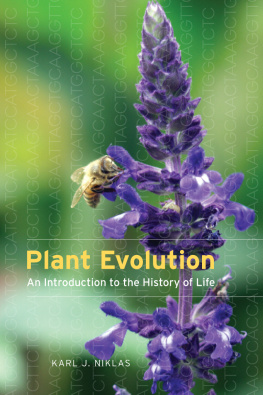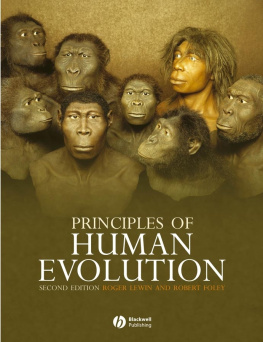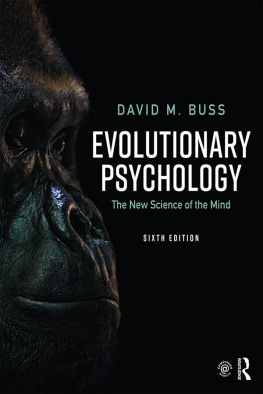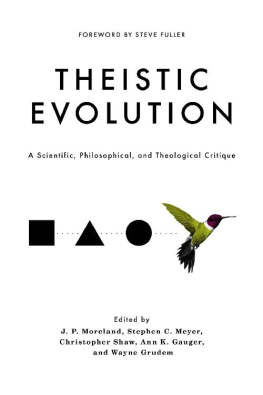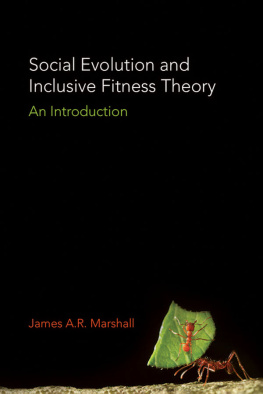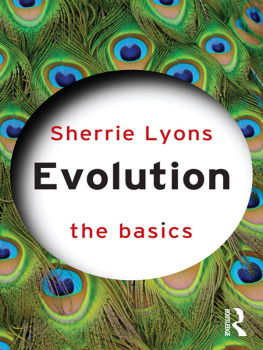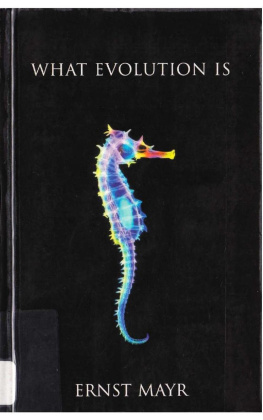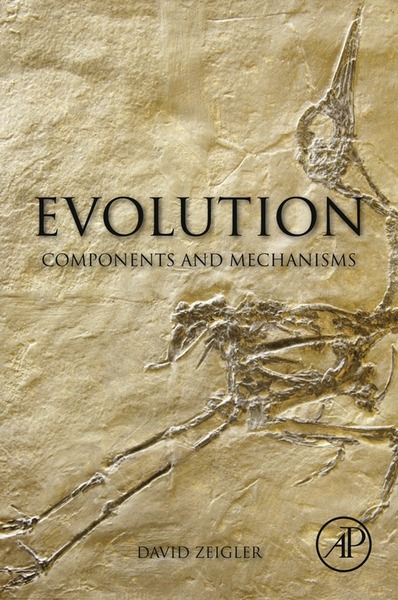Evolution
Components and Mechanisms
David Zeigler, PhD
Department of Biology, University of North Carolina at Pembroke, NC, USA
Table of Contents
Quote
Evolutionary science deserves to be much better understood.
Lynn Margulis
Seen in the light of evolution, biology is, perhaps, intellectually the most satisfying and inspiring science. Without that light it becomes a pile of sundry factssome of them interesting or curious but making no meaningful picture as a whole.
Theodosius Dobzhansky
The evolutionary process of natural selection described by Darwin is just one of the mechanisms leading to the elaboration of a new species.
Alexandre Meinesz
Copyright
Academic Press is an imprint of Elsevier
32 Jamestown Road, London NW1 7BY, UK
225 Wyman Street, Waltham, MA 02451, USA
525 B Street, Suite 1800, San Diego, CA 92101-4495, USA
Copyright 2014 Elsevier Inc. All rights reserved.
No part of this publication may be reproduced, stored in a retrieval system or transmitted in any form or by any means electronic, mechanical, photocopying, recording or otherwise without the prior written permission of the publisher
Permissions may be sought directly from Elseviers Science & Technology Rights Department in Oxford, UK: phone (+44) (0) 1865 843830; fax (+44) (0) 1865 853333; email: for further information
Notices
No responsibility is assumed by the publisher for any injury and/or damage to persons or property as a matter of products liability, negligence or otherwise, or from any use or operation of any methods, products, instructions or ideas contained in the material herein.
Because of rapid advances in the medical sciences, in particular, independent verification of diagnoses and drug dosages should be made
British Library Cataloguing-in-Publication Data
A catalogue record for this book is available from the British Library
Library of Congress Cataloging-in-Publication Data
A catalog record for this book is available from the Library of Congress
ISBN: 978-0-12-800348-0
Cover Image: From Shutterstock, bird fossil of unknown species, Green River, Wyoming, USA.
For information on all Academic Press publications visit our website at elsevierdirect.com
Typeset by TNQ Books and Journals
www.tnq.co.in
Printed and bound in the United States of America
14 15 16 17 10 9 8 7 6 5 4 3 2 1
Preface
Currently, the science of evolution emerges as a new synthesis waiting for the synthesizers.
Antonio Fontdevila
Science is a glorious enterprise.
Niles Eldredge
An obvious question to begin with is: do we really need yet another book on the basics of evolution? In the past two to three decades numerous evolution books have flooded the marketall attempting in one way or another to either explain evolution, or to defend evolution in the ongoing conflict between science and religion as it concerns evolutionary theory. This latter area has become something of a cottage industry that seemingly feeds on itself and generates an almost endless stream of books, each attempting some new or different take on this so-called conflict. A few of these books are quite good and well worth reading, but this book will touch only minimally on the conflict.
Other evolution books make Darwin and the history of evolutionary theory the major focus of discussion. This book only mentions Darwin as needed to explain the modern basics of evolutionof which Darwinism is still a key component. Some of the major textbooks in evolution take a track that is heavy on genetics, mathematics, and modeling, and again, this book only touches lightly on these approaches. Yet another group of recent books addresses and explains the abundant evidence which supports evolutionary theory, and since some of these are excellent works this book does not dwell long on their vast riches of supporting evidence. Finally, several excellent and recent books have specifically addressed the new findings and understandings deriving from the flood of evidence coming from recent genomic studies: this book does include some examples and findings from this rich and newly-elucidated store of informationbut not, however, in great detail.
This book mainly emphasizes the fact that our understanding of biological evolution is an ongoing synthesis of ideas, discoveries, and understandings that grows daily, thanks to the thousands of scientists who make relevant discoveries and contributions on a regular basis. Only in the last decade or two has genomics made significant contributions to our understanding of evolution. Recent significant fossil finds have also added greatly to our understanding of several major clades and transitions. Relatively new discoveries concerning the area of symbiosis have added support to the claims of Lynn Margulis that this has played a significant role in the evolutionary process. The increased recognition of the huge role that contingency has played in the evolution of life on Earth represents another recent theoretical aspect of the modern consensus. These and other contributing areas of knowledge have made the topic of evolution more complexone which now requiringes a good bit of background knowledge to feel comfortable with. In short, evolution is not a static disciplinefar from it. Organic evolution is a rich and evolving scientific discipline of amazing depth and detailone that every educated person should at least attempt to appreciate, since it is the ultimate reason why we and some 10,000,000 other living species now inhabit the Earth.
Though it has been said that evolution by natural selection is a simple idea, today the subject uses a tremendous amount of data from a number of specialty areas, and it carries with it many interesting implications. Stephen J. Goulds 2002 The Structure of Evolutionary Theory at the 1,343rd page of text illustrates this point well, as do some of Ernst Mayrs larger works. Books of this type were written for those who are already well steeped in the basics of evolutionary thought, while this far smaller book is aimed at a broader audience, including those with only an introductory understanding of biology and evolution.
I hope that this book might serve as a sourcebook for review, as an introduction to evolution for the curious learner, or perhaps as a text in an introductory course in evolution. My somewhat unique framework will involve taking evolution apart and explaining separately, chapter by chapter, most of the essential components and mechanisms which together make up our current understanding of the evolutionary process.
We cannot avoid the fact that every large and encompassing area of biology (or any other science) accumulates over time a body of scientific jargon, which hopefully enhances understandingand at the same time reduces the verbiage needed to communicate within the discipline. While this is unavoidable and even necessary, it creates a real need for everyone involved to understand and agree on the meaning of these numerous scientific terms.


